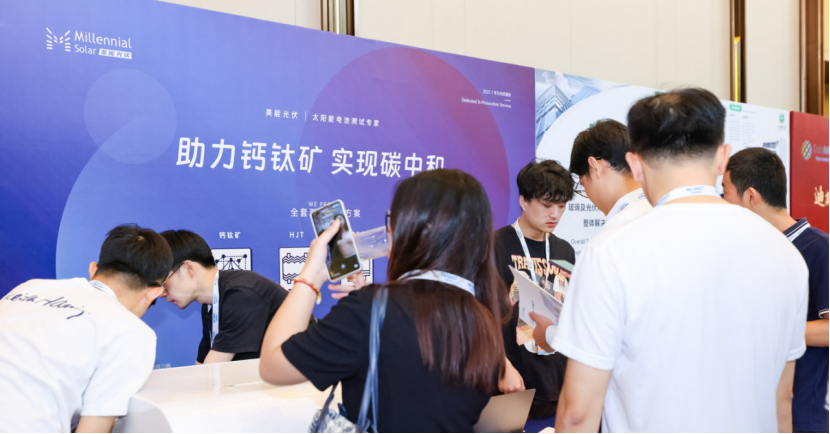
量子效率测试仪
PL/EL一体机
Sinton硅片少子寿命测试仪
Sinton硅块少子寿命测试仪
绒面反射率测试仪
3D共聚焦显微镜
在线四探针方阻测试仪
全自动扫描四探针方阻测试仪
在线薄膜厚度测试仪
晶化率测试仪
Horiba显微共焦拉曼光谱仪
傅里叶红外光谱仪
霍尔效应测试仪
分光光度计
全光谱椭偏仪
Horiba椭圆偏振光谱仪
TLM接触电阻率测试仪
超景深显微镜
网版智能影像测量仪
全自动影像测量仪
卧式拉力机
电池片稳态光衰老化试验箱
电池片紫外老化试验箱
电池片拉脱力综合测试仪
外观检验台
湿漏电测试系统
组件实验室EL测试仪
紫外老化试验箱
稳态光衰老化试验箱
电流连续性监测系统
PID测试系统
旁路二极管测试系统
LeTID测试系统
反向电流过载系统
脉冲电压测试系统
绝缘耐压测试仪
接地连续性测试仪
绝缘耐压接地测试仪
湿热环境试验箱
湿冻环境试验箱
热循环试验箱
动态机械载荷测试机
静态机械载荷测试机
冰雹冲击试验机
引出端强度试验机
霰弹冲击试验机
抗划伤(切割)测试机
剥离试验机
万能材料试验机(单臂)
万能材料试验机(双臂)
光伏玻璃透过率测试仪
醋酸测试试验箱
交联度测试系统
二极管接线盒综合测试仪
落球冲击试验机
半自动四探针
全自动探针式台阶仪
多通道太阳能MPPT系统
Horiba稳瞬态荧光光谱仪
大面积钙钛矿方阻椭偏二合一测试仪
大面积钙钛矿影像显微二合一监测站
钙钛矿P1激光划线测试仪
钙钛矿在线PL测试仪
钙钛矿在线方阻测试仪
钙钛矿在线膜厚测试仪
钙钛矿工艺检测工作站
手持式IV测试仪
便携式EL测试仪
手持热成像测试仪
户外组件多通道测试系统
光伏逆变器电能质量测试仪
无人机EL检测仪
IV测试仪
IVEL分选机
美能光伏资讯 | 美能光伏与您一起回顾钙钛矿技术、设备、材料论坛精彩历程
日期:2023-09-12浏览量:610
9月11日,2023年钙钛矿技术、设备和材料论坛在江苏常州隆重展开,展会现场集结了众多光伏行业的专业人士激烈探讨钙钛矿和叠层电池的市场前景与技术问题。「美能光伏」在此次论坛中大放异彩,且携带了可专门检测钙钛矿和叠层电池以及众多太阳能电池的美能3D共聚焦显微镜与美能四探针电阻测试仪,引得众多光伏行业专业人士的广泛关注和深度重视!

本届展会以钙钛矿光伏领域的技术探讨和创新为主题,包含了众多光伏行业专业人士的精彩发言。钙钛矿和叠层电池的快速发展、为技术、设备和材料供应商带来了巨大的市场机遇,而由于市场需求量的变大,各企业对钙钛矿和叠层电池的质量要求也会随之水涨船高。
![]()
提供高品质、高性能的检测产品
为了更好的满足各个光伏企业用户对钙钛矿和叠层电池的质量要求,「美能光伏」推出了美能3D共聚焦显微镜和美能四探针电阻测试仪,为钙钛矿和叠层电池的生产与发展给予了有力帮助,也为新产能爬坡升级以及降本增速提供了强大动力。
![]()
ME-PT3000美能3D共聚焦显微镜

美能3D共聚焦显微镜是以光学技术为原理、结合精密Z向扫描模块、3D建模算法等对器件表面进行非接触式扫描并建立表面3D图像,通过系统软件对光栅的高度与宽度、绒面上的金字塔数量进行定量检测,以反馈其中的清洗制绒、丝网印刷工艺质量。
● 精确可靠的3D测量,实现实时共聚焦显微图像
● 超高共聚焦镜头,Z轴显示分辨率可达1nm
● 198-39966倍最大综合倍率,精确测量亚微米级形貌
● 全自动光栅绒面测量,快速生成数据
● 全面反馈清洗制绒和丝网印刷工艺
● 赋予多种共聚焦色彩图像
● 一体化操作,中文界面,友好的测量分析软件
![]()
FPP230A美能四探针电阻测试仪

美能四探针电阻测试仪可以对最大230mm的样品进行快速、自动的扫描,获得样品不同位置的方阻/电阻率分布信息,可广泛应用于光伏、半导体、合金、陶瓷等诸多领域。
● 超高测量范围,测量0.1MΩ~100MΩ薄层电阻
● 高精密测量,动态重复率可达0.2%
● 全自动多点扫描,多种预设方案亦可自定义调节
● 快速材料表征,可自动执行矫正因子计算
![]()
美能光伏 备受关注

美能光伏的工作人员正与会场人员激烈探讨钙钛矿技术

美能光伏的展台引得光伏企业人员的广泛关注
2023年钙钛矿技术、设备和材料论坛于9月12日正式落下帷幕,为了更快推动钙钛矿和叠层电池技术的发展与市场的扩张,「美能光伏」将继续与各大光伏企业以及企业用户一起助力钙钛矿、实现碳中和!









































































